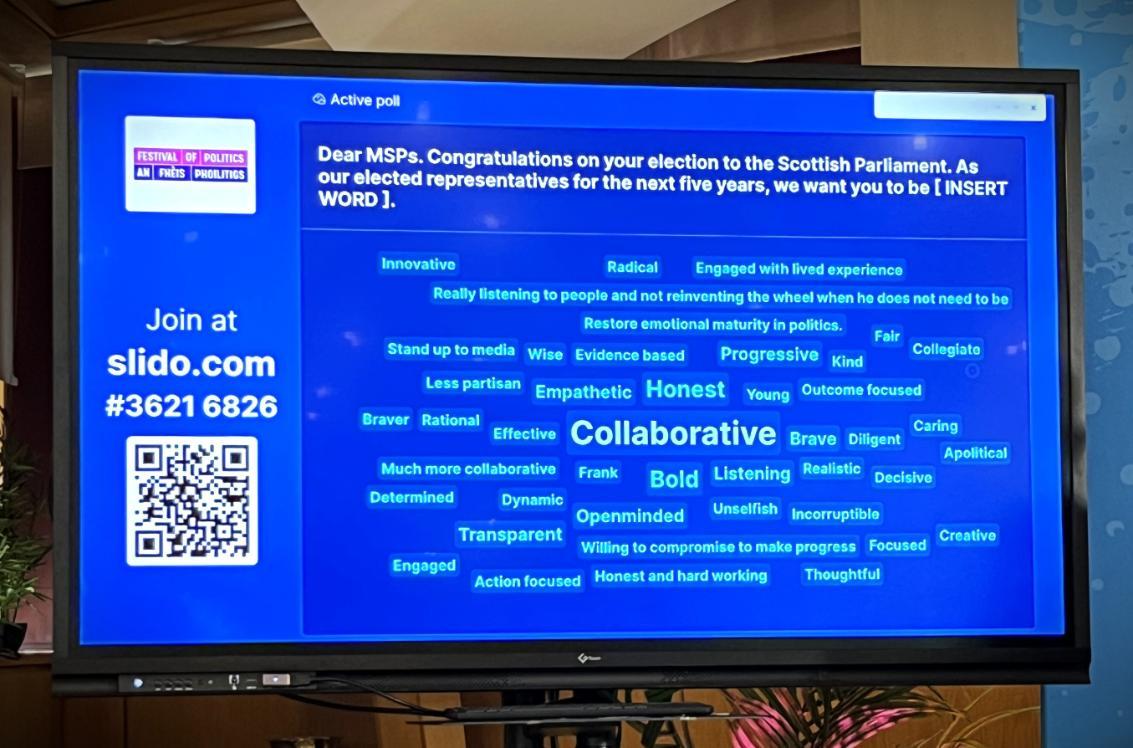Scotland’s Future Policy Challenges: Insights from the Festival of Politics 2025
Published: 4 September 2025
4 September 2025: The Centre for Public Policy partnered with this year’s Festival of Politics, hosting a forward-looking panel setting out some of the challenges likely to face the new intake of parliamentarians elected next May.
The Centre for Public Policy partnered with this year’s Festival of Politics, hosting a forward-looking panel setting out some of the challenges likely to face the new intake of parliamentarians elected next May. This marked the beginning of what will be an intensive year of election-focused work ahead of Holyrood 2026. It was a thoughtful and provocative discussion, chaired by David McGill, Clerk and Chief Executive of the Scottish Parliament, exploring issues such as AI, poverty and social security, fiscal sustainability, and the challenge of governing in what may be a fragmented parliament.
Our session invited attendees to look past the party-political contest to consider the demographic, fiscal, technological, and governance challenges that will confront whichever party or parties take office after next May.
Dr Hayley Bennett, University of Edinburgh, highlighted the risks that the welfare consensus that has dominated Holyrood politics may face greater challenge. Her reflections on the challenge of in-work poverty underlined the need to think beyond child poverty. The complexities of the system – spanning devolved and reserved powers – also underlines the need for more effective collaboration across spheres of government.
Professor Graeme Roy, University of Glasgow, offered a sobering analysis of Scotland’s fiscal framework and economic outlook. His insight into the constraints on public spending underscored the importance of strategic, preventative investment and a realistic reappraisal of the Scottish Government’s budget. This includes the need for mature conversations about revenue-raising, including reforming the Council Tax. Whatever the outcome, he warned that there are no longer any easy choices.
Professor Shannon Vallor, University of Edinburgh, challenged us to think critically about the role of artificial intelligence in public life. She spoke about the need for our representatives to be informed about the opportunities, limitations and risks of technology. The dangers of “solutionism” in our approach to tech policy echoed points made earlier that there are no easy answers to our big policy challenges. She also discussed the prospect of increased misinformation, including deep fakes, during the campaign itself.
The Centre’s Director, Professor Nicola McEwen, considered how the ability of the new administration to confront these policy challenges may be constrained by the prospect of minority government alongside likely increased political and ideological fragmentation in the Scottish Parliament. If that landscape adds to the difficulties of governing, it could lead to a further erosion of trust in the devolved institutions.
The final word went to our audience. Asked what they wanted their new elected representatives to be, most said ‘collaborative’, ‘honest’ and ‘bold’.
Thank you to everyone who joined us at the Festival.
You can watch a full recording of the panel here. Keep an eye on the website for additional insights from our panel on their contributions.
First published: 4 September 2025



